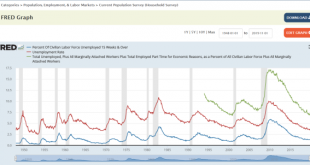Two days ago I posted ‘The macro economic graph of the decade‘. The comments were highly interesting and may be summarized as: “what does ‘headline’ unemployment measure anyway”. About this: Headline of ‘U-3’ unemployment only captures a part of labor slack and is designed to capture only part of total slack. It can however be supplemented with other unemployment measurements which are designed to measure additional slack, like underemployed workers or discouraged workers. But there are...
Read More »Slow burn
That’s the headline for my latest article in Inside Story. Summary graf Hundreds more deaths will result from the particulates created by Australia’s current crop of bushfires At the time of writing, at least fourteen people have been killed by this season’s bushfires. And with most of January and all of February still to come, the number is sure to rise. But these dramatic deaths are far outweighed by the hundreds, perhaps thousands, of deaths that will ultimately result from...
Read More »The criminalization of homelessness
Poverty is the worst form of violence. Mahatma Gandhi This particular Baltimore Sun commentary goes hand in hand with Paul Krugman’s commentary on making life more difficult for the <less than 138% FPL using Medicaid. The motive of the Trumpians. Trump, and Republicans is to punish people for things impacting them through no fault of their own. Trumps plays to a crowd who believe others less fortunate are getting something for nothing. It is an old...
Read More »The Macro economic graph of the decade
Source: eurostat. What did the last decade teach us about (macro-)economics? The graph above is clear: * ‘Drunk driving’ financial crises do happen and cast a long shadow. * Even then, the response to these crises does matter. Eurozone sobriety led to a double dip (in case of unemployment: a double increase). After a crisis, sobriety is not the answer. Remember: the famous ant of the fable of the ant and the grasshopper was not an austerian as he invested in real assets all the time!...
Read More »Mistaken methodologies of science 1
from Asad Zaman The problem at the heart of modern economics is buried in the logical positivist methodological foundations created in the early twentieth century by Lionel Robbins. Substantive debates over the content actually strengthen the illusion of validity of these methods, and hence are counterproductive. As Solow said about Sargent and Lucas, you do not debate cavalry tactics at Austerlitz with a madman who thinks he is Napoleon Bonaparte, feeding his lunacy. Modern Macro Models...
Read More »Making economics relevant
from Maria Alejandra Madi This post was written by Carmelo Ferlito. He is a senior fellow at the Institute for Democracy and Economic Affairs (IDEAS) I taught economics in Malaysia for seven years. My students were mainly second and third year university students who attended my economics classes (microeconomic theory and policy and history of economic thought) after having already learnt the basic notions of macro and microeconomics. Most of my students were double majoring in economics...
Read More »Marking my 2019 forecast to market
by New Deal democrat Marking my 2019 forecast to market One of the things I do at the end of every year, in the interest of transparency, is to go back and see how my 6 and 12 month forecasts for the year panned out. So how did I do this year? Not perfect, but not too shabby either. I marked to forecasts to market Over at Seeking Alpha. As usual, clicking over and reading puts a penny or two in my pocket for my efforts...
Read More »Markov’s inequality (wonkish)
from Lars Syll One of the most beautiful results of probability theory is Markov’s inequality (after the Russian mathematician Andrei Markov (1856-1922)): If X is a non-negative stochastic variable (X ≥ 0) with a finite expectation value E(X), then for every a > 0 P{X ≥ a} ≤ E(X)/a If the production of cars in a factory during a week is assumed to be a stochastic variable with an expectation value (mean) of 50 units, we can – based on nothing else but the inequality – conclude that the...
Read More »Econ 101 – textbook warning
Langkah Ampuh Memperoleh Kemenangan Dalam Main Judi Bola Online
Pemain judi bola online bisa tetap menelusur pergerakan peluang, serta perubahan dalam arah dan kemampuan di pertandingan terkuat, yang bisa banyak macam dengan taruhan pertandingan yang tengah berlangsung. Namun, bikin mencapai kemenangan dalam model permainan di situs judi bola terpercaya evobola, tentu diperlukan atas nama persiapan dalam urusan kekuatan main. Langkah Yang Digunakan Dalam Main Judi Bola Online Dalam permainan judi online evobola, tentunya, jangan lewatkan nama...
Read More » Heterodox
Heterodox




